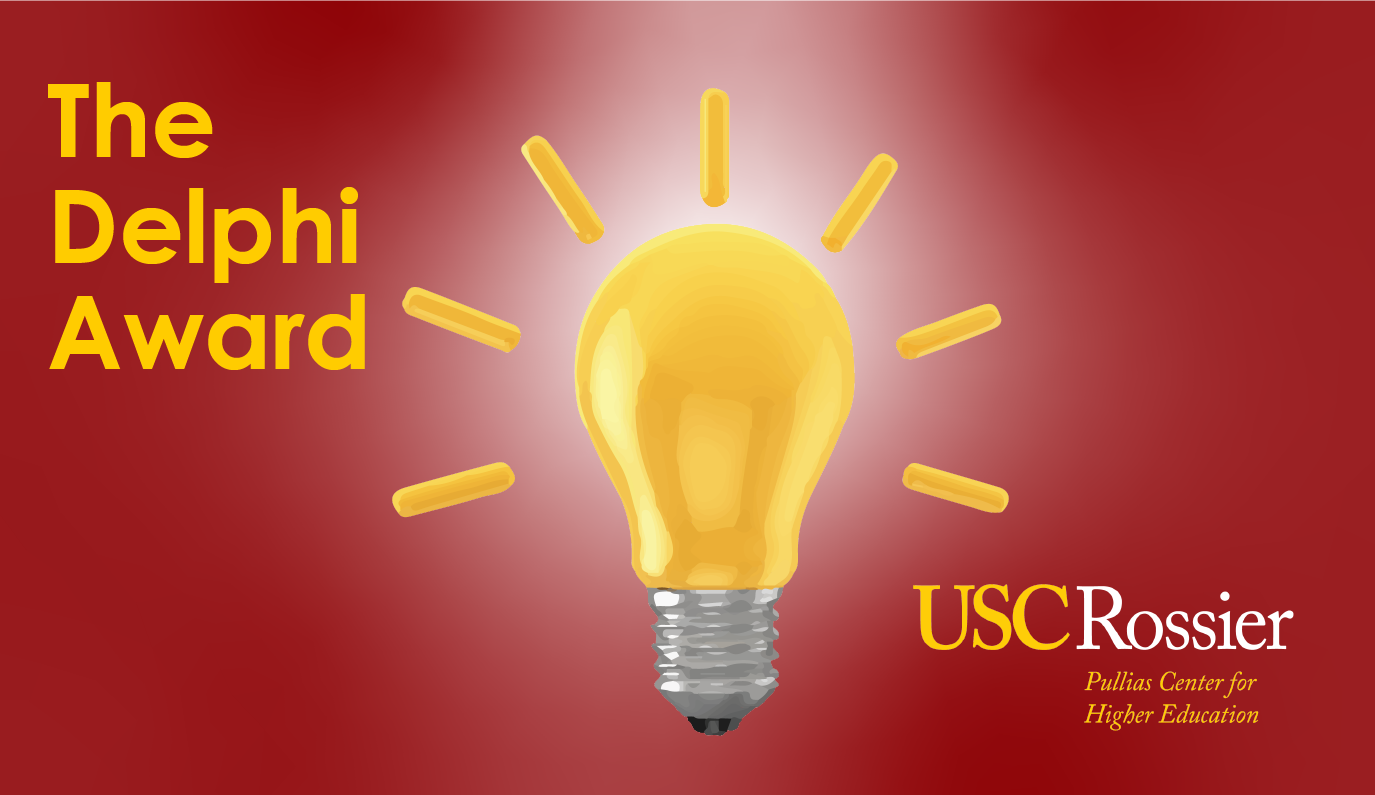
The 2025 Delphi Award Application is Now Closed.
The Award is given annually by the Pullias Center for Higher Education, in partnership with the American Association of Colleges & Universities (AAC&U), and generously sponsored by TIAA Institute.
The purpose of the Delphi Award is to support policies, practices and programs that ameliorate the issues facing VITAL (aka contingent/non-tenure track) faculty.
Click the button below to access the Delphi Award application, but be sure to read through all the information on this page to help you prepare. You can also access the Delphi Award guidelines and application details, here, and see a preview of the actual application, here. The application will now close on July 11, 2025, and winners will be notified in Fall, 2025.

Background & Goals
We use the term VITAL faculty1 — an asset-based term — to refer to contingent or non-tenure-track faculty (including visiting faculty, instructors and lecturers, adjuncts, research faculty, and clinical faculty) as a way to affirm what they are, rather than what they are not.
Learn More...
The employment practices, policies, programs, and models for VITAL (Visiting, Instructing, Temporary, Adjunct and Lecturing) faculty are not aligned with the intended direction of college completion and student success initiatives on a majority of campuses — and instead, interfere with these goals, causing broad problems in higher education. With the goal of addressing this misalignment, the Delphi Award has two primary purposes:
- To encourage campuses, groups, departments, or academic units to rethink VITAL faculty models, practices, programs, and policies; and
- To provide material support that helps colleges and universities overcome barriers to scaling the innovative faculty supports they have initiated.
Over the last two decades, the campus environments and faculty life have changed radically. Various studies from the Delphi Project on the Changing Faculty and Student Success have demonstrated how changes work directly against the types of support needed for student success, and especially for first-generation, underrepresented minority and low-income students.
- Currently, more than 70% of all faculty at colleges and universities are in VITAL faculty positions.
- Many VITAL faculty lack needed resources, including an office on campus for meeting with students and administrative support, and they are generally not compensated for their labor, including in supporting students and providing service to their campuses and community.
- VITAL faculty generally have minimal time to prepare for classes and are often hired days before the class starts.
- Often, VITAL faculty members are left out of discussions and planning around curriculum or broader program and college goals.
- Typically, VITAL faculty are excluded from professional development where they might participate in discussions about pedagogies that support student success such as collaborative or active learning.
- VITAL faculty have limited information about the students they teach because they are not invited to or compensated for attending orientations or sessions where information about students and their background are shared.
The purpose of the Delphi Award is to support policies, practices, and programs that ameliorate the issues facing VITAL faculty. This is particularly important because VITAL faculty bring assets and benefits to campuses, departments, and academic units but are often prevented from using their talents effectively to support students and contribute to institutional priorities aligned with improving campus(es) and contributing to the learning mission of higher education.
1 Levy, 2019
The Who's and How's:
We seek applications from a wide range of groups at multiple levels who have made changes to support their VITAL faculty. Eligibility includes small groups (faculty task forces, faculty senates) as well as larger groups and organizations (e.g. associations, disciplinary societies, consortia). An individual may apply, but it MUST be on behalf of their institution.
Applicants are not limited to colleges or universities, but we require that applicants show they are connected to and have an impact on colleges or universities, given that colleges and universities are the primary contexts wherein VITAL faculty do their work (see the Criteria section on this page, and on the application for details).
How to Win The Delphi Award
Learn More...
We hope to select winners that have made alterations such as the following:
- Practice (e.g., appropriate orientations, responsible hiring processes, feedback and evaluation, prioritization of issues related to contingent faculty)
- Policies (e.g., promotion and advancement, participation in governance, compensation, academic freedom protections)
- Programs and Services (e.g., mentoring, leadership development, professional development processes)
- Implementation of new faculty models (e.g. a new contract type or model of faculty beyond the adjunct or research-intensive faculty model. See the Adapting by Design Report for examples.)
For further ideas or to see if the work you are doing might be applicable for this award, see the Case Studies from previous winners.

Winners of the 2024 Delphi Award (l-r): Adrianna Kezar (Pullias/Delphi Project), Ashley Finley (AAC&U), Christiane Healey (UMassAmherst), Michelle Budig (UMassAmherst), Anne Ollen (TIAA Institute), Kate Birdsall (MSU), Sonja Fritzsche (MSU) KC Culver (Delphi Project)
What's the Criteria? How We Determine the Winners
Learn More...
The following criteria is used to evaluate the degree to which applications provide evidence that the policy, program, practice or model:
- Is designed in keeping with strategic institutional priorities, is aligned with improving campus(es) goals, and contributes to the learning mission of higher education.
- Was enacted in partnership or with support from one or more host colleges or universities.
- Is assisting VITAL faculty in being more effective in their work.
- Can be scaled, replicated, and/or emulated at other institutions (e.g., other institutions might be able to adopt the approach with minimum difficulty).
- Has been designed in collaboration with the VITAL faculty that the program, policy, practice, or model is aimed at.
- Is being institutionalized and will be sustained. Evidence may entail inclusion in strategic plans, stated leadership commitment, fundraising and development aimed at supporting the practice, or other demonstrations of continuity beyond the first year of implementation.
- Employs a theory of action that explains how the program, policy, practice or model supports VITAL faculty, and how that support helps VITAL faculty in turn contribute to institutional priorities aligned with improving campus(es).
If relevant, we also encourage applicants to provide evidence that the policy, program, practice, or model:
- Is impacting student success. If including such evidence, please also articulate your definition of student success. For example, evidence of student success might include graduation rates, persistence rates, course passing rates, GPA, or other measures of student success.
- Has resulted in organizational learning for the institution/department/unit that has encouraged rethinking other policies, programs, practices, or models.
We do not anticipate that every program, policy, model, or practice will demonstrate all the criteria above, but most of our previous winners meet multiple criteria. Each submission will be reviewed holistically with these criteria in mind. We are interested in innovations that may not follow existing best practices.
If you have questions about the criteria for the Delphi Award, please send us an email at pullias@usc.edu
The Selection Process
The Pullias Center and AAC&U invite nominations for this Award but also encourage direct applications for this Award. Nominated entities will be invited to fill out an application.
After the application deadline closes, we will convene a panel of judges familiar with faculty policies, practices and programs. The panel will review qualified applications, evaluate them against the stated criteria, and make a decision by September of the application year. At that point, the winners will be notified and asked to attend the AAC&U annual conference the following January to receive the Award.

The Fine Print
Award funding should be used to support on-going implementation of the policy if in process, to expand the policy or practice, or to develop and support a new policy or practice for faculty. Award recipients must make themselves available to the Delphi Project research team for subsequent questions, interviews, and to provide additional data collection regarding their activities. These activities will contribute to the case study written for each winner and posted on the Pullias Center's website.
The Delphi Award Advisory Board
Thanks to our Advisory Board members:
Angel Royel — American Association of Community Colleges
Ashley Finley — American Association of Colleges & Universities
Cynthia Wilson — League of Innovation
Gayle Kiser — College and University Personnel Association for Human Resources
Johnathan Iuzzini — Achieving the Dream
Maria Maisto — New Faculty Majority
Nikki Edgecombe — Community College Research Center, Teachers College, Columbia University
Adrianna Kezar — Director, the Delphi Project on the Changing Faculty & Student Success
KC Culver — Associate Director, the Delphi Project on the Changing Faculty & Student Success







